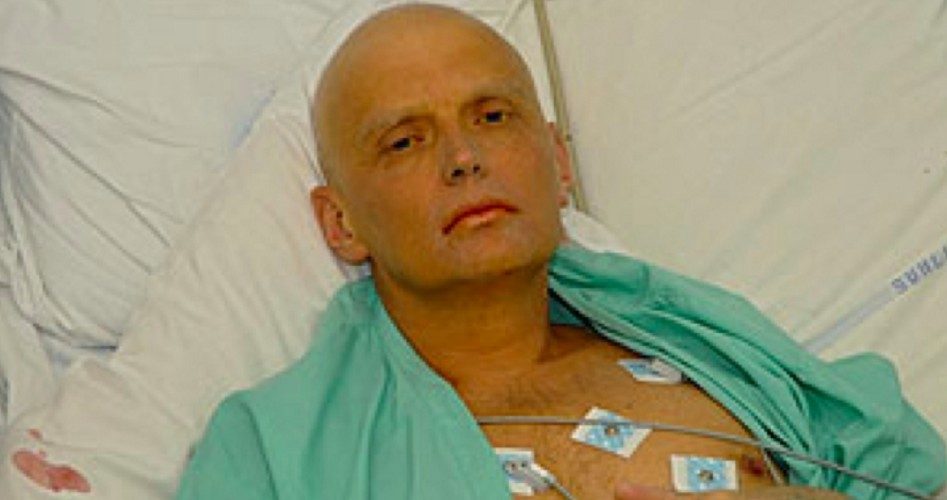
The British press was awash with reports on January 21 about the release of the findings of an inquiry led by British High Court Justice Sir Robert Owen that concluded that Russian President Vladimir Putin “probably” approved a 2006 Russian intelligence operation to murder ex-KGB/FSB agent Alexander Litvinenko, who had defected to the United Kingdom. Litvinenko, who is shown here in the hospital, died of polonium 210 poisoning.
Click on the title to view The Litvenko Inquiry: Report into the death of Alexander Litvenko in its entirety. All statements in the first person in the report can be attributed to the inquiry’s chairman, Sir Robert Owen.
Among the “Summary of Conclusions” of the 300-page report, which begin on page 245, are:
I am sure that Mr. Litvinenko did not ingest the polonium 210 either by accident or to commit suicide. I am sure, rather, that he was deliberately poisoned by others.
I am sure that Mr. [Andrey] Lugovoy and Mr. [Dmitri] Kovtun were acting on behalf of others when they poisoned Mr. Litvinenko.
When Mr. Lugovoy poisoned Mr. Litvinenko, it is probable that he did so under the direction of the FSB. I would add that I regard that as a strong probability. I have found that Mr. Kovtun also took part in the poisoning. I conclude therefore that he was also acting under FSB direction, possibly indirectly through Mr. Lugovoy but probably to his knowledge.
The FSB operation to kill Mr. Litvinenko was probably approved by Mr. [Nikolai] Patrushev [the head of the Federal Security Service (FSB) in 2006] and also by President Putin.
The British-based Reuters news service reported that Russia had declined to cooperate in the inquiry, and had cautioned that it could “poison” relations between the two countries.
Litvinenko, who had started his career with the old Soviet KGB in 1968 and became a member of the central staff of the KGB’s successor organizations — the FSK and the FSB — fled to the UK in 2000. He died six years later after drinking tea laced with polonium 210 in the Pine Bar of London’s Mayfair Millennium Hotel. Polonium 210, a radioactive isotope, is by mass about 250,000 times more toxic than hydrogen cyanide. Almost all of the world’s production of polonium 210, which is manufactured in a nuclear reactor by bombarding bismuth with neutrons, is done in Russia.
Litvinenko had met at the hotel bar with three Russian “businessmen’’: Andrei Lugovoi (Andrey Logovoy), Dmitry (Dimitri) Kovtun, and Vyacheslav Sokolenko. After Litvinenko’s death, when British police detectives from Scotland Yard went to Russia to interview a number of witnesses and suspects in the case, including the three men who had met with Litvinenko, they were told that two of the major persons of interest, Lugovoi and Kovtun, were in hospital quarantine for radiation poisoning.
The British detectives were not granted free access to interview the suspects, but were informed by Russia’s chief prosecutor Yuri Chaika that they would be relegated to the role of observers as Russian police carried out the interviews. Neither would the Russians cooperate in extraditing any of the suspects to Britain.
Instead of recognizing the legitimacy of the British authorities’ suspicions, the Russian press, which is under the control of Putin’s government, has repeatedly blamed Putin’s enemies for Litvinenko’s murder, most frequently citing Boris Berezovsky, a former Putin ally who was also in exile in London, but who died in 2013.
Berezovsky was mentioned in the just-released British inquiry, which identified him as a close friend of Litvinenko. The report noted that Berezovsky was a man of great wealth and political influence who had assisted Putin’s rise to power. However, the report noted:
[Berezovsky] fell out with Mr. Putin shortly after the latter’s election as President in March 2000. He left Russia permanently at the end of 2000 and claimed asylum in the UK. Thereafter, Mr. Berezovsky became a vociferous critic of Mr. Putin. Repeated attempts by Russia to secure his extradition were unsuccessful, and Mr. Berezovsky was granted asylum in the UK in 2003. He spent much of his wealth in opposing President Putin’s regime, and in supporting others who did the same — one of whom, as we shall see, was Mr. Litvinenko.
When the inquest into Mr. Litvinenko’s death was resumed in 2011, Mr. Berezovsky was granted interested person status. He was entitled to such status not least because, as we shall see, allegations had been made that he had been involved in Mr. Litvinenko’s death. Those acting for Mr. Berezovsky played a constructive part in the early stages of the inquest proceedings, making submissions at directions hearings and disclosing documentation. Mr. Berezovsky’s involvement in these proceedings was, however, cut short by his own death in March 2013.
The report noted: “Had Mr. Berezovsky been alive at the time of the Inquiry hearings, he would undoubtedly have been an important witness.”
Berezovsky was found dead at his home in England on March 23, 2013. His body was found by a bodyguard in a locked bathroom, with a ligature around his neck. Following an inquest into the death in March 2014 the coroner, Peter Bedford, recorded an open verdict that neither ruled out nor confirmed that his death was a suicide: “I am not saying Mr. Berezovsky took his own life, I am not saying Mr. Berezovsky was unlawfully killed. What I am saying is that the burden of proof sets such a high standard it is impossible for me to say.”
The inquiry report thoroughly addressed an allegation that Litvinenko’s friendship with Berezovsky had ended and that the two had become at odds “about money in the months before he died, that he then tried to blackmail Mr. Berezovsky, and that as a result Mr. Berezovsky ordered his killing.” The report noted that the allegation had been made “principally, but not solely, by Andrey Lugovoy [Andrei Lugovoi — one of the men who had met with Litvinenko on the day he was poisoned and who was considered a key suspect in his murder].”
The report also noted that Litvinenko’s widow, Marina, had disputed allegations that her husband and Berezovsky had experienced a falling out, noting:
She was very clear that the underlying friendship between her husband and Mr. Berezovsky had not been broken. She agreed with the proposition that Mr. Litvinenko and Mr. Berezovsky were close friends until Mr. Litvinenko’s death and added, “I knew these two people have been very special to each other.”
After citing much evidence related to the relationship between Litvinenko and Berezovsky, Owen wrote in the report:
I have now made the finding that it was Mr. Lugovoy, with Mr. Kovtun, who killed Mr. Litvinenko.
There is no evidence at all that Mr. Lugovoy might have been acting on Mr. Berezovsky’s behalf, and that hypothesis is inconsistent with the actions of both men since Mr. Litvinenko’s death….
In summary, I am quite satisfied that Mr. Berezovsky bore no responsibility for Mr. Litvinenko’s death.
The significance in clearing Berezovsky of responsibility for Litvinenko’s death is that is focuses attention for his murder on the most likely suspects — former FSB head Nikolai Patrushev and Putin.
In a statement to Parliament made in response to the release of the inquiry report, Home Secretary Theresa May said:
The conclusion that the Russian state was probably involved in the murder of Mr. Litvinenko is deeply disturbing. This was a blatant and unacceptable breach of the most fundamental tenets of international law and of civilized behavior.
Not unsurprisingly, Russia’s RT seized upon the word “probably” in the inquiry report to discount it. “According to the report, Vladimir Putin and his administration ‘probably’ had motive to murder Litvinenko,” noted RT. The Russian broadcaster quoted a statement from journalist and broadcaster Neil Clark, who told them:
This man was killed, was murdered in London almost 10 years ago. This latest report was set up in July 2014 — interestingly, just a couple of weeks after the MH17 disaster. So it was set up in this particular climate, this anti-Russia climate, and it has gone on now for 18 months. And what have they come up with — they’ve come up with a verdict that “probably” this was the work of the Kremlin. “Probably” — is not evidence.
While it may be true that “probably” is not evidence, probable cause has long been regarded as sufficient reason to initiate further investigation.
Reuters noted that Litvinenko had told detectives from his deathbed that he believed that Putin, who was a KGB colonel who went on to head the FSB before becoming president, had directly ordered his killing. “There was undoubtedly a personal dimension to the antagonism between Mr. Litvinenko on the one hand and President Putin on the other,” noted the inquiry report.
In his article for The New American posted on January 22, 2007 (“Putin, Poison, Murder”), William F. Jasper offered what he considered to be the damning evidence that “most likely sealed Alexander Litvinenko’s death warrant.” Litvinenko had made it known that Italy’s prime minister, Romano Prodi, was known as the KGB’s top man in Italy.
When Litvinenko was planning to flee from Russia in 2000, he consulted his former KGB boss and trusted friend, General Anatoly Trofimov, who advised him not to seek refuge in Italy, since there were so many KGB agents there. “Don’t go to Italy,” Trofimov said, “There are many KGB agents among the politicians: Romano Prodi is our man there.”
Italy’s Mitrokhin/Guzzanti Commission was interested in what Litvinenko had to say about Prodi and had sent one of its investigators, Mario Scaramella, to meet with him. Scaramella met with Litvinenko in London shortly before Litvinenko’s meeting with the Russians — reportedly to warn Litvinenko about an assassination plot against Litvinenko and Italian Senator Guzzanti.
Jasper wrote in his report:
On November 20, 2006, just three days before Litvinenko’s death, Prodi fired the chiefs of three of Italy’s intelligence agencies, all of whom would have been important to any investigation of the Mitrokhin information. If Prodi is Moscow’s man, as General Trofimov is alleged to have said, then Russia’s intelligence structures would stop at nothing to protect such a valuable, long-term investment.
Killing Litvinenko was presumably among the options the Russians could have used to silence the exposure of Prodi’s connections to the Russian intelligence network.
Interestingly, Scaramella’s name also came up in the inquiry report. Owen wrote:
In the course of his discussions with Mr. Scaramella, Mr. Litvinenko claimed to have evidence that Romano Prodi, the senior Italian politician, was a KGB agent. Mr. Scaramella said that: “Litvinenko presented this information as the most important information in his hands.”…
Mr. Scaramella’s evidence was that he arranged to see Mr. Litvinenko on 1 November because he wanted to pass on to him information that he had received about a possible threat to Mr. Litvinenko’s safety from individuals linked to the Russian security services….
Mr. Scaramella said that he had had a series of communications with Mr. Limarev during October about what he understood to be an increasing threat to a group of individuals on a Russian “hitlist.” The “targets” included Anna Politkovskaya, Mr. Scaramella himself, Mr. Guzzanti, Mr. Berezovsky, Mr. Zakayev and Mr. Litvinenko. Mr. Scaramella said that Mr. Limarev had spoken to him of the possibility that radioactive poisons might be used against these targets.
Scaramella’s warning to Litvinenko, as cited in the report, therefore, concurs with the information provided by Jasper in his 2007 article exploring a probable motive for a Russian hit on Litvinenko.
Several reports appeared in the British press in recent years stating that Litvinenko had been working with or for British intelligence agencies MI6 or MI5 during the last part of his life, and offered this as a possible motivation for the Russians wanting him dead.
When Litvinenko’s father, Walter Litvinenko, who now lives in Italy, read these reports, he withdrew his previous accusations against Putin and the FSB for ordering his son’s death and apologized to the Russian leaders. In a statement to RT in 2012, the elder Litvinenko said:
If only I had known that my son had worked for British intelligence I would not have talked about his death. He could easily have been shot as a double agent. Traitors should be shot.
However, he conceded he could not be 100 percent sure that his son really did work for MI6.
In a statement made in 2015, widow, Marina, said: “I knew he did work for MI6 or MI5 but he was never an agent.” The Financial Times reported that Mrs. Litvinenko said in testimony at the Royal Courts of Justice that she believed her husband was serving as a consultant to British intelligence in its investigations of organized crime.
While the entire truth about the killing of Alexander Litvinenko may never be learned, the spotlight shone on his death by the inquiry should at the very least stimulate further investigation.
Photo: Alexander Litvinenko
Related articles:
Russian FSB Defector Reveals Kremlin Supports ISIS
Putin Critic Nemtsov Murdered; 100,000 March to Honor Him
Poisoned KGB Defector Exposed Russia’s Backing of al-Qaeda


